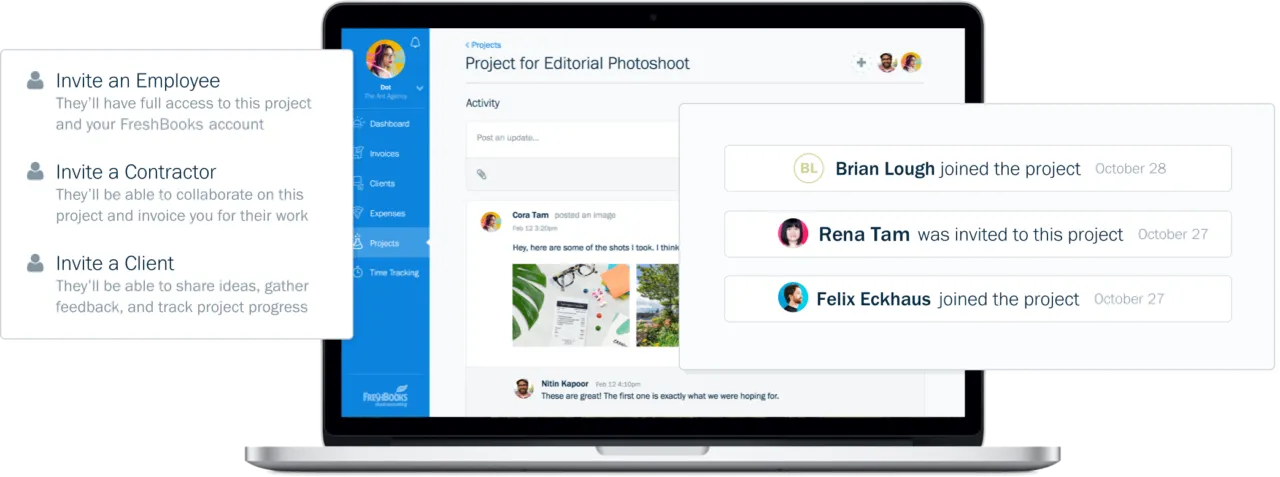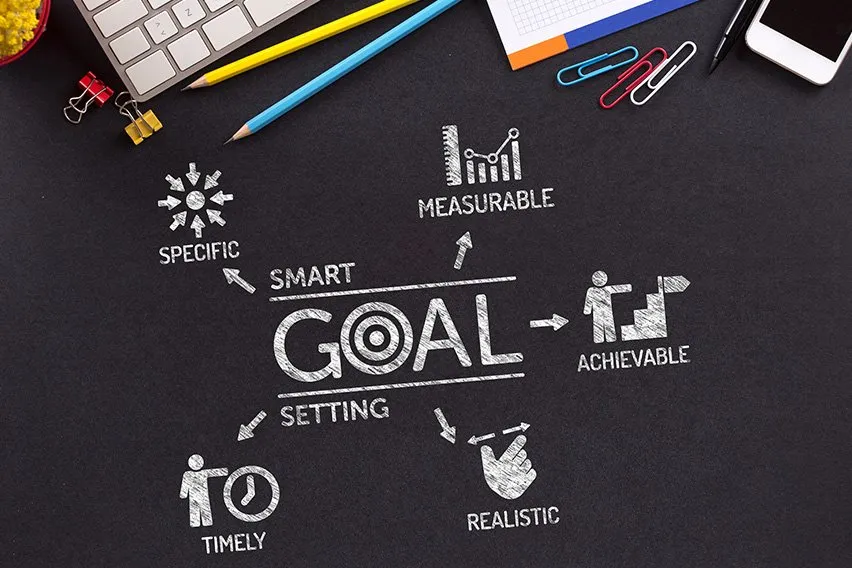Top 10 Personal Business Goals Examples for 2025

Do you have a professional development goal? Change can sometimes feel daunting, but it doesn’t have to be an overwhelming task. A lot of successful people set milestones that are specific and measurable to help make a realistic goal become a success.
Everyone works differently and has other things going on in their lives, so some strategies will work better than others. The main thing is to make sure your goals are achievable while you maintain a healthy work-life balance. If they’re not, you are just setting yourself up for failure.
One way to improve productivity while reducing stress and finding more time to do the things you love, like spending time with family, is automating processes, like incorporating accounting, planning, and tracking software into your business processes. Doing this will reduce the time and mental space spent on these tasks, allowing you the freedom to work on the creative side of your business or take a day off every once in a while. A good balance between your personal and professional life can make all the difference in your mental health and achieving your professional development goals.
FreshBooks offers a variety of helpful tools that will help you with everything in your professional life, from bookkeeping to client management.
Click here to learn more about how FreshBooks can improve your overall quality of life and give you more free time to spend away from the computer.
There are also individual business goals that you can set and achieve that will help you avoid becoming overwhelmed in life. Let’s take a look at the top 10 personal business goals that will help you reach professional success.
Key Takeaways
- A healthy work-life balance can help you avoid burnout
- Setting professional development goals and learning new professional skills can help you with your career advancement
- Stepping outside of your comfort zone can help you achieve great results in your professional life
- Being creative and becoming a thought leader can position you at the top of your field
- Keeping the body and mind healthy is the key to stress reduction
- Earning a promotion can be as simple as improving your focus through targeted goal setting
- Knowing your limits while embracing discomfort can help you expand your reach without overextending yourself
- Setting SMART goals is the most effective way to achieve big dreams
Here’s what we’ll cover:
What Are Professional Development Goals?
The Top 10 Personal Business Goals
What Are Personal Development Goals for Work?
How Can You Achieve Your Career Goals?
What Are Professional Development Goals?
A professional development goal is any objective you want to set for yourself that will help you enhance your career. Examples of professional goals include learning new relevant skills, finding more satisfaction in the workplace, expanding your network, leveling up your credentials, or taking up leadership opportunities when presented.
Some examples of personal goals you may wish to achieve include incorporating self-care into your routine, improving public speaking skills, limiting social media usage, and working to change procrastination habits.
Both personal and professional development goals can help you get ahead, keeping you productive and up-to-date on new trends, improving networks, and ensuring you build a life that is right for you, so you feel satisfied in your career and life.
The easiest way to set achievable goals, both in your personal and professional life, is by utilizing the SMART method. This means that the goals you choose should be:
- SPECIFIC, with every step laid out including what needs to be accomplished, and the steps that need to be taken
- MEASURABLE, by setting trackable benchmarks, like specific dates you will practice a new skill, the number of hours a week you allow yourself to spend online, a specific financial saving goal, etc.
- ACHIEVABLE, starting small and realistically. Don’t set yourself up for failure. Choose something you can definitely accomplish with a little work.
- RELEVANT and pertinent to the overall vision. Knowing the “why” behind the goal will keep you motivated, and your goal will keep you moving toward the life you envision for yourself
- TIME-BOUND, as a time parameter, will keep you on track and give you a deadline to hit
When you use the SMART method, achieving personal development goals is much easier. This framework is designed to make goal achievement realistic in both your personal life and your professional career.
The Top 10 Personal Business Goals
You can throw your own personal spin on goal setting and alter them so they work with your needs. There isn’t a perfect recipe for figuring out which goals to set. You just need to make sure you have achievable goals, and they’re attainable and measurable.
This way, you have the best possible chance of success regardless of your ultimate goal or professional development goal. Here are the top 10 personal business goals you can set and achieve.

1. Improve your Online Image
There can be a thousand moving parts to staying relevant online in today’s digital world. But there are certain things you can do to help improve your online image. One of the first things you should do, if you haven’t already, is make sure you own your domain name.
It could be your personal or company name, but try to ensure it’s relevant to your business. You can also think about investing in high-quality headshots from a professional photographer. This will help make your social media profiles and website stand out.
They will also give you something professional to send to organizers if you’re speaking at an event or making another public appearance. As well, spend some time putting together a portfolio of your best work.
You can share it online or post samples to your LinkedIn page. For example, tons of free writing portfolio websites are available that can make it simple and easy to drag and drop documents.
2. Become a Thought Leader
It’s never too early to start to position yourself as a thought leader or authority in your industry. Reach out and contact appropriate business people to try and moderate or speak on a panel. You can also enquire about appearing on a podcast or a guest blog post.
Identifying every opportunity you can to share your knowledge and business expertise can have a positive impact in the long run. You can build your credibility and audience and grow into a thought-provoking leader.
3. Find a New Business Idea
Do you spend a lot of time thinking about your business and ways that you can grow or expand? Some of those ideas might seem far-fetched or out of reach. But why do they have to be? What personal and business goals would you hope to achieve by starting your company?
Develop a new idea, implement it, and establish yourself as a leader in your field. And you don’t just have to limit yourself to things like industry blogs or social media. You can get inspired by other people’s work and put your own spin on it.
4. Get Comfortable Being Uncomfortable
It might seem like a bit of a cliche, but getting outside your comfort zone can have many positive benefits. It might seem scary, but doing something drastic like speaking in public or attending networking events can be a good start. You can improve your communication skills and take actionable steps toward personal growth.
Sometimes getting outside your comfort zone is simply about finding ways to become better, even in the smallest of ways. It also allows you to realize that there are things about yourself you might have underestimated before and helps build emotional intelligence and self-awareness.
5. Learn a New Skill
Nobody knows everything. There are always opportunities to learn and improve, and learning a new skill is one way to do that. You can meet new people, and there are many free courses and resources online.
Education doesn’t have to be expensive or time-consuming. Discuss some options with your employer or workplace and see if they offer training. Some of the most desired skills in today’s economy include:
- Coding
- Excel skills
- Web development
- Copywriting
- Public speaking
- Google Analytics
- Digital Marketing
- Time management
- Project management
Meeting project management goals, collaborating with your team, and tracking time and expenses is so much simpler using FreshBooks project management software. Click here for a free trial, so you can free up mental space and improve your overall productivity.

6. Monitor and Evaluate Your Health
Keeping your mind and body healthy is integral to staying productive, energetic, and engaged in your work. Go to the dentist, schedule a checkup with your doctor, and take plenty of time for self-care. Get creative with your health goals while recognizing areas where you can take a break, reset, and return with more focus and drive. Sleeping well, eating healthy food, and getting exercise will keep your body fit and help you avoid missing work due to stress and preventable physical health issues.
7. Start a Side Hustle
Sometimes, long-term goals don’t necessarily improve your company or allow you to increase your skills. Perhaps you want to start a business, work for yourself, or transition into a different industry or business sector.
A side hustle can help get you there. It can also provide some increased financials that might make it easier to pay off debts or bills if you have any.
8. Earn a Promotion
Earning a promotion takes planning, so it’s definitely a long-term goal instead of a short-term one. You can get started now to prepare yourself for any upcoming performance review. Make it a personal work goal to try and exceed any of your previous performance metrics.
This improvement will demonstrate you have value to the company and you have substantial leadership capability. These are important skills and personality traits businesses want to keep on their team.
Try thinking of some new tasks or projects you could undertake. You could learn new skills or develop relationships outside of business. Whatever it is, it shows initiative and that you are an integral part of the business operations.
9. Improve Your Focus
Learning to tune out distractions and avoid downtime can help increase your productivity. Try and turn off your phone or leave it in another room while working. This will leave you less tempted to check notifications and surf through social media.
It’s difficult to focus when you’re burned out, so try and keep a healthy work and life balance. This will help ensure you’re energized and motivated when you return to work. You can also try and block off certain periods to grab a snack or take a walk to return to your work focused.
10. Boost Your Confidence
Everyone has moments of doubt and feelings of inadequacy. Try and make some personal goals to improve or boost your confidence. You can ask more questions in meetings or learn to trust your gut and intuition.
Accepting that you are going to make mistakes is a great place to start. No one is perfect, and making mistakes allows you to learn. You can understand what happened and ensure you make proper adjustments, so it doesn’t happen again in the future.
Having regular meetings with a project manager or coworker to discuss challenges at work can also make things easier. When details are discussed in the open, it makes them more actionable and real.
What Are Personal Development Goals for Work?
Take a look at some of these personal development goals that can make you even more focused and productive at work.
- Include time for personal interests and hobbies
- Embrace saying “no” to certain things
- Keep a journal of daily occurrences
- Volunteer to take a break from the grind of daily business activities
- Become a mentor to share your expertise with the next generation
- Improving communication skills
- Better time management skills

How Can You Achieve Your Career Goals?
Taking the first step to achieve your goals is writing them down. But do you have a plan or strategy to reach your goals? How are you going to get to where you want to go?
Here are five tips to help you achieve your career goals.
1. Embrace the journey
It can sometimes take a long time to achieve your career goals, they don’t often happen overnight. It’s important to embrace the experiences along the way instead of being narrowly focused on a singular path. Things can happen differently or unexpectedly, and that’s okay.
2. Know what you’re willing to sacrifice
What are you willing to give up or sacrifice to achieve your career goals? For example, if being close to friends and family is important to you, moving far away for a dream job might not work out. Or, if you love to travel, committing to a job that keeps you behind a desk might be a recipe for disaster. You want your career path to be fulfilling, not draining.
3. Take your struggles in stride
There are going to be rough patches and moments of stress. You can work with a mentor or someone who can help provide advice and solutions to help you get through any struggles.
4. Give back when you can
Paying it forward is one of those things that have unintended positive results. Help other young professionals or students through mentoring or by offering career advice. Do you remember someone who gave you advice early in your career and how helpful it was? Try and return the favor and give back when you can.
5. Set measurable goals
Goals and milestones are useless if they’re not attainable. Use the SMART goals process, which is an acronym for specific, measurable, achievable, relevant, and time-bound. This framework helps ensure your goals are specific and quantifiable.
Why Set Goals For Work?
Setting achievable work goals will keep you motivated and stop your skills from atrophying. Remaining still in one position for a long period of time can become boring and demotivating for many people, so giving yourself additional challenges will keep you engaged and excited.
Goal setting is also important because of it:
- This will set you apart from the rest and give you a good reputation amongst higher-ups as somebody who can achieve great things and is not afraid to try new things
- Encourages optimism in the workplace, which can be contagious and lead to a happier and healthier workplace for everybody
- Helps you manage your time effectively and better focus on relevant tasks
- Keeps you up to date on industry trends and keeps you employable as technology changes
- Keeps your team aligned, which leads to faster growth in small businesses
Conclusion
Balancing work and personal life can become stressful. You want to ensure you are delivering on your tasks and responsibilities at work, but you also want to have time at home with friends and family. It can sometimes be even more difficult to try and set personal business goals to achieve.
The good news is that there are tons of things that you can do to help you set your goals and ultimately achieve them. Becoming a thought leader, generating new business ideas, or improving your focus are just goals you can set and achieve. When you are figuring out which goals you want to set, it’s important to make sure that they’re attainable and specific. If they’re not, your journey to achieving them will become bumpy and likely have some detours. Use the SMART acronym to help make sure your goals are quantifiable and contribute to your growth mindset.
Did you enjoy reading this guide? Head over to our leadership category for more great content!
FAQs on Personal Business Goals
How do you write a personal goal for a business?
When writing a personal goal for your business, it is important to identify your objective, or the “why” behind the goal, to discover what success will mean to you. Using the SMART (specific, measurable, achievable, relevant, and time-based) acronym will help with this step.
Next, you will need to create a plan that can be broken down into small, actionable steps and milestones. This way, you can measure how far you have come toward the goal and make adjustments if necessary. Monitoring your progress and reviewing the plan regularly will keep you on track.
What is a typical business goal?
Business goals vary between industries but will be specific, measurable, achievable, relevant, and time-based. Some common business goals include increasing shareholder value, growing the business, incorporating new services or products, reducing employee turnover, or reaching out to the community. The goal is to keep the business continually progressing and improving.
What are personal and professional goals?
Both personal and professional goals are objectives that can be worked toward in order to improve quality of life in some way. Personal goals often pertain to a person’s lifestyle and family life, while professional goals are aspirations that can help you succeed in your career or improve your workplace performance.
What goals can I set for myself?
Some goals you can set that will help you in your personal and professional life include things like improving your time management, limiting internet usage, taking better care of your physical and mental health, achieving specific financial goals, stepping outside of your comfort zone, or learning new skills.
What personal and business goals would you hope to achieve by starting your company?
When thinking about starting your own company, what are the goals you want to achieve? Some common answers to this question include financial freedom, early retirement, making a career change, professional growth, having flexible hours, and having a better work-life balance.
You will have to think about your own life and what you hope to gain from starting your own company. Will it bring you a higher sense of satisfaction to work for yourself? Will you enjoy having more control over the business end of things?
Reviewed by
Kristen Slavin is a CPA with 16 years of experience, specializing in accounting, bookkeeping, and tax services for small businesses. A member of the CPA Association of BC, she also holds a Master’s Degree in Business Administration from Simon Fraser University. In her spare time, Kristen enjoys camping, hiking, and road tripping with her husband and two children. In 2022 Kristen founded K10 Accounting. The firm offers bookkeeping and accounting services for business and personal needs, as well as ERP consulting and audit assistance.
RELATED ARTICLES


 8 Tips for First-Time Managers to Hit the Ground Running
8 Tips for First-Time Managers to Hit the Ground Running How to Coach Employees: 5 Best Practices
How to Coach Employees: 5 Best Practices How to Develop Leadership Skills in Employees. Top 5 Ways
How to Develop Leadership Skills in Employees. Top 5 Ways Setting Employee Goals: The Why and How of Goal-Setting
Setting Employee Goals: The Why and How of Goal-Setting What are SMART goals? Acronym Explained
What are SMART goals? Acronym Explained Small Business Management: An Extensive Guide
Small Business Management: An Extensive Guide